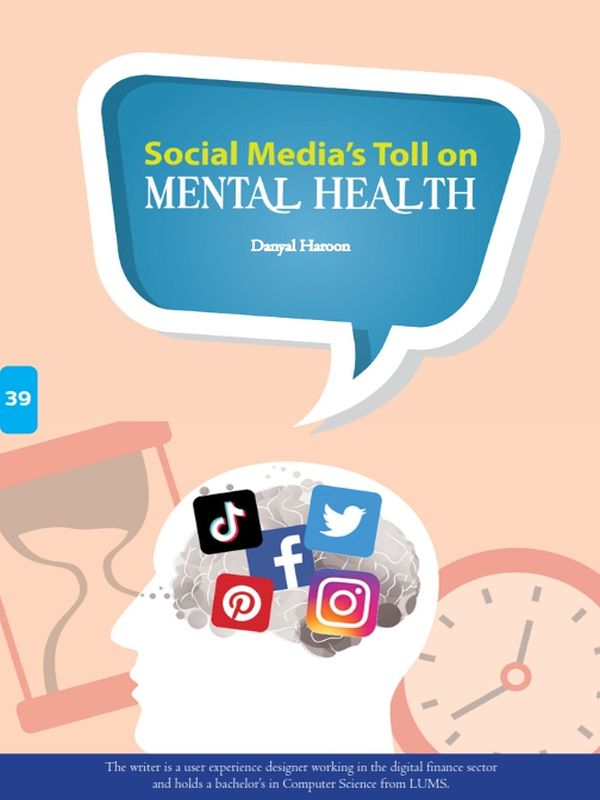
Pakistan Institute of Development Economics
- Home
Our Portals
MenuMenuMenuMenuMenuMenuMenu - ResearchMenuMenuMenuMenuMenuMenuMenu
- Discourse
- The PDR
- Our Researchers
- Academics
- Degree Verification
- Thesis Portal
- Our Portals
Social Media’s Toll on Mental Health
Over the past decade, communication technology has evolved at such an unprecedented rate that we are struggling to keep up. Social media platforms such as Facebook and Twitter started out as simple tools for online communication; now, they are hubs of global information exchange which spark a lot of debate and sometimes controversy. Our engagement with social media is increasing day by day thanks to algorithms that push content onto our feeds that retains our attention. Increased usage of social media has led to noticeable changes in our behavior and negative impacts on our mental well-being.
Social media used to be a predominantly urban phenomenon with most initial users possessing a high level of digital literacy. With the availability of affordable internet and smartphones, social media gained traction in all strata of society in both developed and developing countries. According to a survey conducted by Gallup in 2021, 28% of Pakistanis in urban areas and 24% in rural areas claimed to use TikTok. While these statistics may be slightly exaggerated, TikTok does have over 18 million users in Pakistan. The fascinating thing is that – unlike Coca-Cola or McDonald’s – TikTok did not exist until a few years ago and they have no physical presence in Pakistan.
Twitter has over 3 million users in Pakistan which is much less than TikTok, but the platform houses a fair amount of political discourse in Pakistan. Twitter users tend to voice their opinions very vocally, which is pertinent in an age of increased media censorship. Although most discourse on Twitter in Pakistan revolves around politics and sports, it is interesting to note that many younger users – those in their late teens and early twenties – now use the platform as a personal diary. They share problems from their daily life and sometimes their insecurities as well. The #MeToo movement is an example of how users opened up about abuse incidents they had been through.
People like to share personal details from their life even though Twitter is a public platform. Perhaps they feel comfortable doing this because social media gives them the liberty to create and adopt an online persona. This persona may reflect their actual personality, a particular facet of their personality, or a completely different personality altogether. Some people go so far as to adopt the personas of other individuals. Anwar Maqsood is a popular one in Pakistan. However, this is not only unethical but also against Twitter’s guidelines.
With people so heavily invested in it, social media has real impacts at an individual and community level. A study titled WhatsApp Vigilantes conducted by professors at the London School of Economics showed how misinformation on social media triggered mob violence in India. Social media is loaded with content that is often exaggerated or false but seems real to us. A common example of this is hate speech, something almost every regular Twitter user experiences at some point. If I post a controversial Tweet, I am likely to receive hateful comments from “keyboard warriors”. If the same people were sitting with me at a social gathering, it is highly unlikely that they will utter the same words to my face. Social media gives them a shield of impunity and anonymity. I know that, but my mind still internalizes the hateful comments at a subconscious level.
Then there is the echo-chamber effect. The content you see on your feed is carefully curated by algorithms according to your taste. The content on my feed will be different from yours because we have different interests and worldviews. Essentially, both of us are in chambers where our existing beliefs are reinforced by the content we see. Unless we talk to each other, our exposure to different worldviews becomes limited.
Algorithms are also designed to retain as much of our attention as possible. Video platforms are particularly good at this because they can throw your down an endless spiral. Hundreds of hours of video are uploaded to YouTube every minute. While we do not usually pay to use social media, advertisers pay social media companies to buy our time and attention. It is no coincidence that you see adverts for products that you talked to a friend about or merely thought about. Algorithms are analyzing your patterns through multiple data points.
According to Jaron Lanier, author of the book Ten Arguments for Deleting Your Social Media Accounts Right Now, social media is different from television or billboards because when you see content on it, you are being observed constantly and algorithms are taking in that information to show you content which eventually changes your behavior. Privacy concerns arise from this, even though social media companies claim that your data is kept anonymous.
To ensure that we do not fall prey to the addictive nature of social media, it is important to evaluate the nature of our engagement with it. Let us avoid mindless scrolling. Ask yourself the question: does the amount of time I invest in social media produce positive outcomes in my life? Our phones now have tools such as app timers and notification blockers to help regulate our screen time. If you feel that your social media usage is an addiction, there are professionals who can help you overcome it. Regaining your time and lost focus will not be easy, but it will allow you to live in a healthier state of mind.
The writer is a user experience designer working in the digital finance sector and holds a bachelor’s in computer science from LUMS.



